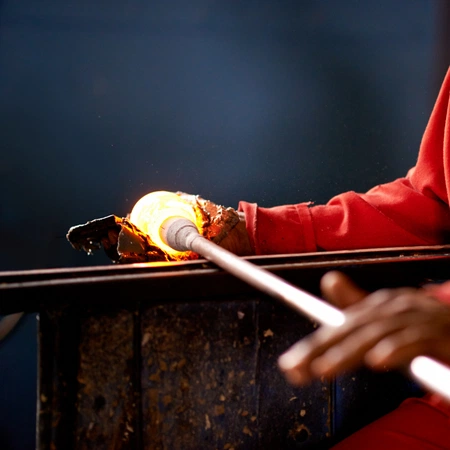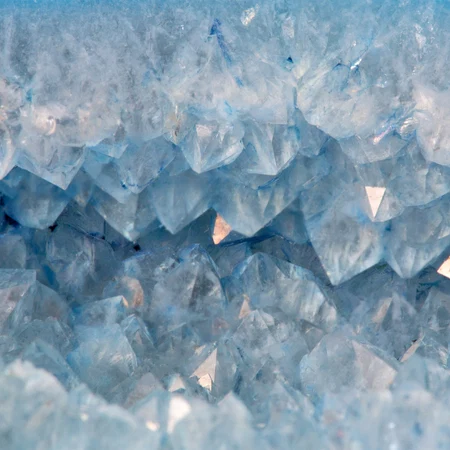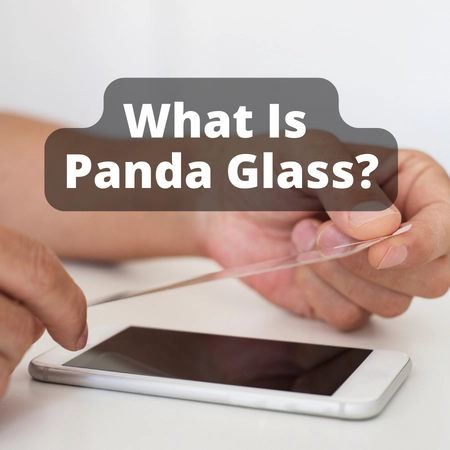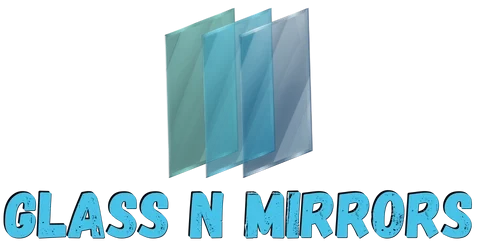Many people claim that glass helps prevent skin damage due to sunlight because it can block UV light. Given that some types of mirrors are also partially made of glass, do mirrors reflect UV light?
As a general rule, most mirrors will only reflect a very small amount of UV light as the glass on the front of them absorbs the majority. In saying this, mirrors that are made from polished aluminum can reflect as much as 80% of the UV light.
To better explain the scientific concepts at work here, I’ve written this article as an introduction and discussion about how UV light interacts with mirrors and other reflective surfaces.

Table of Contents
- 1 What Is UV Light?
- 2 How Does UV Light Affect Humans?
- 3 What Is a Mirror?
- 4 Is UV Light Reflected by Mirror?
- 5 Does UV Light Reflect Off Glass?
- 6 Can a Mirror Reflect IR?
- 7 What Surfaces Reflect UV Rays?
- 8 Conclusion -Do mirrors reflect UV?
- 9 Hot Glass vs Cold Glass – What’s The Difference?
- 10 Can Quartz Be Made Into Glass? Guide On Quartz & Glass
- 11 What Is Panda Glass | Ultimate Guide To Panda Glass
What Is UV Light?
Ultraviolet (UV) light refers to a type of electromagnetic radiation that originates from the sun. Several studies have shown that it can cause significant damage to living cells.
Much like visible light, UV rays are transmitted in particles or waves. Because the range of the wavelengths varies, experts have also identified 3 sub-bands of UV light:
- UVA
Also known as near UV, the wavelengths for this type fall somewhere from 315 to 400 nanometers. Of the three, this is the closest to the visible light spectrum. About 95% of all UV radiation that reaches humans belongs to this sub-band.
- UVB
The middle UV has a wavelength range of 280 to 315 nanometers. This is the type of UV light that can be almost completely absorbed by the glass.
- UVC
This is referred to as the far UV. Its wavelength ranges from 180 to 280 nanometers. The planet’s atmosphere absorbs all UVC that enters from the sun so it is not considered as harmful, unlike the damage that UVA and UVB can cause to people’s health.
Do mirrors have lag? See my post showing the truth.
Take note that various environmental factors determine how much UV radiation may be expected. For example:
- Presence of Clouds – The lack of clouds in the sky means that the UV light reaching the ground is at its highest level. A few stray clouds have minimal effect on filtering UV radiation. In certain cases, their scattering may even boost UV radiation. Read my full article that explains Do mirrors reflect heat?
You might assume that a cloudy day will completely protect you from the effects of UV. However, staying unprotected under the sky, especially around highly reflective surfaces, will cause skin damage, too.
- Type of Ground – As you will learn later on in this article, different kinds of surfaces can reflect UV light.
- Those who are hanging out at the beach may still be exposed to UV even if they are under an umbrella because dry sand can reflect up to 18% UV. At around 80%, fresh snow reflects even more UV radiation than grassy areas, which can reflect about 5% of UV light only. Could the cold of the snow cause your mirror to break?
- Altitude
The higher your location is, the greater the exposure to UV radiation is going to be. According to experts, it increases by 10% for every 1,000 meters (or 3,280.84 feet) in altitude.
Why?
The atmosphere gets thinner the higher you go. As such, there is also less atmosphere to absorb UV light.
How Does UV Light Affect Humans?
Whether it is UVA or UVB, prolonged exposure to UV radiation damages the body, especially the skin.
Between the two, however, UVA causes more severe harm than UVB light.
- Effects of UVA Light
UVA radiation can penetrate deeply into the human skin. Aside from immediate tanning, it can speed up the signs of aging, such as the appearance of wrinkles or age spots.
| Did You Know That… |
| UV light is highly damaging to the eyes? If a person does not wear proper eye protection, prolonged or frequent exposure to UV light can significantly increase the risk of developing serious—and sometimes irreparable—eye conditions, such as cataracts and macular degeneration. The latter ultimately leads to the complete loss of sight. That’s why experts advise those who work with UV light to always wear safety glasses that have polycarbonate lenses which can block 99.9% of UV radiation. |
Dermatologists used to believe that UVA does not have other long-term effects. However, recent studies have shown that UVA also contributes to the development of serious skin conditions including skin cancer.
- Effects of UVB Light
Though UVB can only penetrate the upper layers of the skin, it has been linked to skin cancer and accelerated aging, too. With regards to short-term effects, UVB can cause sunburn and tanning—though it occurs at a slower rate than when caused by UVA.
Glass absorbs UV light which is what
is typically found on the front of most mirrors
What Is a Mirror?
Technically speaking, a mirror is any surface that can reflect different kinds of light that reaches it. Given this definition, a well-polished metal may be considered a mirror.
In general, however, an average person thinks of a mirror as an object made of glass that has a metallic backing. It is often thought that mirrors make you look shorter. I explain the truth in that article.
Various types of metal are used for mirror fabrication. Throughout history, the commonly used materials have changed as well. For example:
- Advanced civilizations in the ancient world made use of polished gold or bronze to serve as their mirrors.
- During the middle ages, mirrors were made by putting mercury or tin foils as backing.
- Thin metallic coatings had been first introduced by Justus von Liebig in the 19th century.
- In the modern era, mirrors are also being used for scientific studies and applications, such as precision optics and setups involving lasers. As such, the metallic backing has to be very thin and produced with incredibly high accuracy.
Based on this brief overview of its history, mirrors have not always been made of glass. They may also be highly polished metals like gold or silver. If a water surface is clear and tranquil, then during that particular moment, it can also be considered as a mirror.
Did you know the truth about 2-way mirrors? Read my article on are 2-way mirrors bad?
Is UV Light Reflected by Mirror?
Yes, mirrors can reflect UV light but it depends on how they are constructed.
Mirrors made of polished aluminum have the highest reflectance when it comes to UV light—about 80 to 90%. Aluminum also has a relatively high reflectance of visible light and near-infrared light spectrums.
| Take note that some manufacturers have also developed special types of glasses that have high UV light transmissivity. Mirrors made of those glasses are rarely found in commonplace settings like your home or the local shopping center, however. |
On the other hand, the reflecting ability of mirrors is significantly diminished when the aluminum is placed behind glass. That’s because glass absorbs UV light, particularly the middle UV.
The wall mirror in your bathroom is likely made of glass and metallic backing. If so, then you can’t expect this mirror to reflect a lot of UV light.
Scientific laboratories, however, typically use polished metals as mirrors in their setups.
What’s the difference, you might ask?
- These mirrors do not have a glass layer over the metal part.
- The surface of the metal is significantly smoother than the ones used as backing for the common mirror.
- Aside from aluminum, the metal used for such mirrors may also be gold, silver, or copper.
There is also a complex type of laboratory mirror known as the dielectric mirror. It is usually a concave mirror that is intended to reflect a particular wavelength or band ranging from 300 to 2000 nanometers, depending on the design. This means that it can also be used to reflect UV light in a lab setting.
Be sure to check out the truth about the commonly asked question, Do mirrors make you look bigger?
Does UV Light Reflect Off Glass?
UV light does not reflect off glass. An ordinary glass absorbs UVB light, but around 75% of UVA light can pass through this material.
UVB radiation has been linked to sunburn so the claim that glass can protect you from becoming sunburned is true.
Unfortunately, exposure to UVA light can lead to more serious skin conditions such as premature aging and skin cancer. Therefore, ordinary glass does not completely reflect UV light; neither does it offer total protection from skin damage.
Are mirror lenses any good? Sunglasses or camera? See my article that explains more.
The great thing is, some companies have developed special coatings for glass to enhance its ability to block and reflect UVA and UVB radiation. Such coated glass is often used by eyewear companies that sell protective sunglasses.
Tinted glass can also block UV light to a higher degree than ordinary glass. However, about 60% of UVA radiation still passes through tinted glass, so you should still wear sunscreen even when you are inside your home, office, or vehicle.
Can a Mirror Reflect IR?
Only some types of mirrors can reflect Infra-Red light. Those mirrors made from highly polished metals usually reflect the most IR.
Before we discuss how IR behaves when it makes contact with a mirror, let’s go over first what IR means.
Infrared radiation (IR) refers to a type of energy that humans typically perceive as heat. It is invisible to the naked eye, so we just feel it being emitted from its sources, such as an open flame.
Not all heat you feel signifies infrared radiation though. Heat can be transferred in two other ways: conduction and convection. One of the qualities that set IR apart is the way its waves travel.
Much like UV light, IR wavelengths also change, depending on their origin.
- “Near-infrared waves” are not hot enough to be detected by human senses. This type is the kind of IR that remote controls discharge when you use it to change channels while watching TV.
- On the other hand, “far-infrared waves” are more readily detectable by humans because of their relatively intense heat. If you’re sitting in front of a bonfire while camping with your friends, you would feel the heat radiating from the fire without even touching it.
So, going back to the earlier question, does a mirror reflect IR?
Yes, mirrors made of highly polished metals can reflect IR.
This means that metal mirrors can transfer the warmth caused by a room heater from one area to another as long as it is placed properly and the metallic material used for the mirror has high reflectance—for example, aluminum.
Dielectric mirrors can also reflect infrared radiation. However, rather than aluminum, experts suggest using mirrors made of polished gold or silver since these materials are better at reflecting IR.
As we have discussed earlier, dielectric mirrors are particularly useful in scientific experiments since the degree of IR reflectance may be adjusted according to the needs of the study.
What Surfaces Reflect UV Rays?
Aside from mirrors, UV rays may be reflected off by different kinds of surfaces that can be easily found in your environment, such as painted walls, the pavement, open water, and snow.
The reflectance changes depending on how smooth or coarse the surface is. In general, the smoother a surface is, the more UV light it can reflect.
Another factor that affects a surface’s reflectance is whether or not the said surface is hard or soft. In this regard, harder surfaces reflect more UV radiation than soft materials.
To better illustrate how various types of surfaces reflect UV light, take a look at the table below:
| Type of Surface | Percentage of UV Reflected |
| Manicured Lawn | 2 to 5% |
| Wild Grassland | 0.8 to 1.6% |
| Wooden Deck | 6.6% |
| Concrete Footpath | 8.2 to 12% |
| Fresh Snow | 88% |
| Old Snow | 50% |
| Dry Sand | 15 to 18% |
| Wet Sand | 7.1% |
Conclusion -Do mirrors reflect UV?
- Not all types of mirrors can reflect UV light.
- The way they are constructed determines how much UV will be absorbed and how much will be reflected off.
- One of the best materials when it comes to reflecting UV light is aluminum.
- Glass, however, will significantly reduce the ability of the mirror’s metallic component from reflecting UV.
- Aside from UV light, mirrors may also reflect visible light and IR light.
As a final note, while the common mirrors that people use cannot reflect much UV light, don’t assume that you can use a mirror to indirectly look or observe the sun. Enough UV radiation would still be reflected to cause damage to the human eyes.
-
Hot Glass vs Cold Glass – What’s The Difference?

When most people think of glass, they probably think of windows or drinking glasses. But there is a lot more to glass than that. In fact, there are two main … Keep Reading
-
Can Quartz Be Made Into Glass? Guide On Quartz & Glass

Glass making is a process that involves heating and cooling sand and other minerals. You may wonder whether it is possible to make glass out of quartz. Glass is made … Keep Reading
-
What Is Panda Glass | Ultimate Guide To Panda Glass

When looking for a new phone case, you may have encountered the term “panda glass.” A variety of phone cases on the market use this type of glass. But what … Keep Reading

1 thought on “Do Mirrors Reflect UV Light? You Could Be in Danger”
Comments are closed.